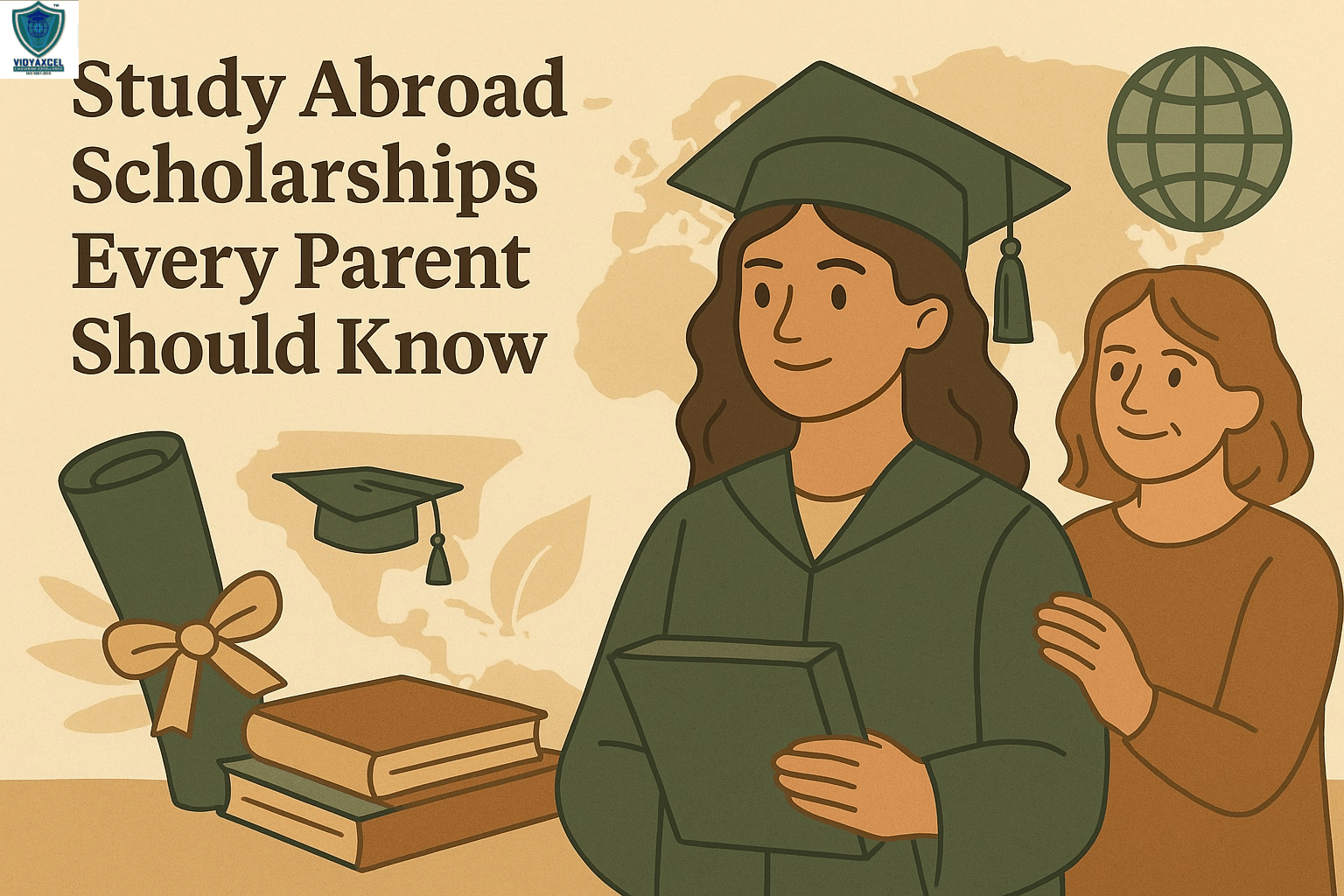Blog Details

17May
Study Abroad Scholarships Every Parent Should Know
Studying abroad can be one of the most transformative and enriching experiences in a young person’s life. From world-class education to cross-cultural exposure and enhanced career prospects, the benefits are undeniable. However, one of the biggest hurdles family’s faces is the financial burden associated with international education. Thankfully, scholarships provide a crucial lifeline, making overseas education accessible to more students than ever before. This comprehensive guide explores key study abroad scholarships across countries, eligibility criteria, tips for parents, and how to support your child through the application journey.
Why Scholarships Matter
1 Reducing Financial Stress: Tuition fees, living expenses, travel, and insurance costs can quickly add up. Scholarships alleviate this burden.
2 Encouraging Equal Opportunity: Financial aid ensures students from all economic backgrounds can pursue their dreams.
3 Enhancing Motivation: The recognition of a scholarship award can boost a student’s self-esteem and academic motivation.
4 Access to Better Institutions: Scholarships often open doors to globally renowned universities that may otherwise be unaffordable.
Top Scholarships by Destination Country
1 United States:
- Fulbright Program: For graduate study and research, fully funded.
- Hubert H. Humphrey Fellowship: Mid-career professionals, non-degree program.
- International Peace Scholarship (for Women): For women pursuing graduate study in the U.S. or Canada.
- University-Specific (e.g., Stanford Knight-Hennessy, Harvard Financial Aid, Yale Young Global Scholars).
2 United Kingdom:
- Chevening Scholarships: UK government-funded, fully covers master’s programs.
- Commonwealth Scholarships: For students from Commonwealth countries.
- Rhodes Scholarships: Prestigious scholarship for study at Oxford.
- Gates Cambridge Scholarships: For exceptional applicants at the University of Cambridge.
3 Canada:
- Vanier Canada Graduate Scholarships: For doctoral studies.
- Lester B. Pearson International Scholarship: For undergraduates at the University of Toronto.
- Trudeau Foundation Scholarships: For doctoral candidates in social sciences and humanities.
4 Australia:
- Australia Awards Scholarships: Government-funded, covering full costs.
- Destination Australia Program: For students studying in regional Australia.
- University-specific options (e.g., Melbourne International Undergraduate Scholarship).
5 Europe (General):
- Erasmus+ Program: For exchange students across the EU.
- DAAD Scholarships (Germany): Covers various programs at all levels.
- Eiffel Excellence Program (France): For master’s and PhD.
- Swedish Institute Scholarships for Global Professionals (Sweden).
How Parents Can Support the Scholarship Journey
1 Early Planning: Encourage your child to begin research in Grade 9 or 10.
2 Open Communication: Understand your child’s aspirations and help align them with realistic scholarship opportunities.
3 Encourage Extracurricular Engagement: Many scholarships look beyond academics.
4 Assist in Application Review: Help with proofreading essays and organizing documents.
5 Stay Informed: Join school counselling sessions, webinars, and parent forums.
Common Scholarship Requirements
- Academic transcripts
- Standardized test scores (SAT, ACT, IELTS, TOEFL, etc.)
- Letters of Recommendation
- Statement of Purpose/Essays
- Proof of financial need (for need-based aid)
- Extracurricular portfolio or achievements
Tips for a Successful Application
1 Tailor Applications: Avoid generic submissions; customize each essay.
2 Meet Deadlines: Maintain a master calendar.
3 Stay Authentic: Personal stories create powerful essays.
4 Prepare for Interviews: Practice commonly asked questions.
5 Maintain Grades: Many scholarships require a minimum GPA to retain funding.
Conclusion
While the journey to studying abroad can feel overwhelming, scholarships make it significantly more attainable. As a parent, your proactive involvement, encouragement, and informed guidance can be the difference between a missed opportunity and a life-changing academic experience. Start early, stay engaged, and help your child reach for the stars—one scholarship at a time.
FAQ’s
How old should a teenager be to start volunteering?
Most NGOs and community organizations accept volunteers from age 14 and up, depending on the nature of the work. For younger teens, school-led initiatives or family volunteering can be a good starting point.
What types of volunteering activities can help in career exploration?
Activities like tutoring, working with children or animals, environmental cleanups, assisting in health camps, or supporting events can expose teens to a wide range of soft and technical skills—helping them discover interests aligned with possible career paths.
Can volunteering really influence a student’s career decision?
Absolutely. Volunteering offers real-world exposure, helps develop empathy, and reveals strengths or passions that formal academics may not. In Aanya’s case, it led her to a career in child psychology that she hadn’t considered before.
How can parents support teens in finding suitable volunteering opportunities?
Parents can support by researching local NGOs, school programs, or digital volunteering platforms, helping with applications, and being encouraging—even if the activity doesn’t directly relate to traditional career choices.
Does volunteering help with college admissions?
Yes. Many universities, especially abroad, value community service and volunteering in their admissions process. It shows leadership, initiative, compassion, and real-world engagement—all qualities colleges look for.
Our Office: West Bengal, Maharashtra & Delhi.
For More Infomation about admission in Medical, Engineering, Management & Study in Overseas Details.
View Current Study Overseas, Medical, Engineering & Management Admission Details Video.





